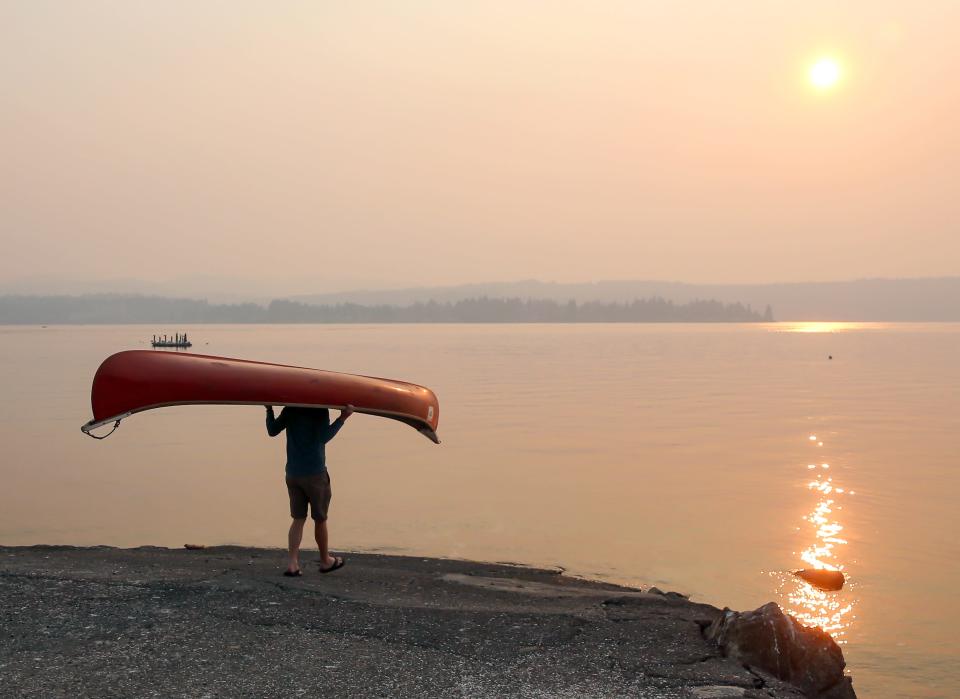Wildfire season has started in Washington. Is smoke coming to West Sound?
Wildfires are burning across the Pacific Northwest, and public health officials are encouraging West Sound residents to prepare for the possibility of smoky conditions and poor air quality.
What are wildfire conditions like now?
Washington is in the midst of what is likely to be a hotter and drier than normal summer, according to the state Department of Health.
As of July 25, nine large, active wildfires are burning in Washington, collectively covering more than 114,000 acres, according to the National Interagency Coordination Center. All nine are east of the Cascades.
There are currently 89 large wildfires burning across the county, according to the NICC, including 34 in Oregon, 6 in Idaho and 15 in California.
The largest in Washington is the Big Horn Fire, near the Columbia River south of Yakima. It covers about 33,000 acres. Near Lake Chelan, the Pioneer Fire covers about 31,000 acres.

How to monitor air quality in Western Washington
Fires have contributed to air quality degradation in some parts of Eastern Washington, particularly near the Yakima Valley – where firefighters are dealing with multiple fires, according to the Yakima Herald.
Western Washington’s air quality has remained unimpacted and is not expected to see any changes in the immediate future, according to the Washington Smoke Blog.
To stay updated on conditions, the Washington Department of Ecology has launched a map of real-time air quality updates at ecology.wa.gov/AirQualityWA.
“We have added more information to our interactive air quality map and made it even easier to access, so everyone can protect themselves from the dangers of smoke and other forms of air pollution,” Kathy Taylor, manager of Ecology’s Air Quality program, said in a press release.
Burn bans now in place
Kitsap County and unincorporated Pierce County remain under a burn ban. Outdoor burning is prohibited except for cooking fires in contained barbecue units and small recreational fires in designated pits that are away from buildings and less than three feet in diameter.
Yard debris burning is also prohibited until Oct. 15 for those living within the Gig Harbor Fire & Medic One District (zip codes: 98332, 98333 and 98335). This does not apply to recreational fires.
How to prepare for smoke
Wildfire smoke contains tiny particles and gasses that can enter your lungs and bloodstream, causing or exacerbating health problems, according to the Kitsap Public Health District.
That can cause a range of minor to severe health impacts, including: eye, nose and throat irritation, fatigue, headaches, shortness of breath, and poor mental health.
Children, the elderly, people who are pregnant, those with existing respiratory conditions, those who work outdoors and the unhoused are all at the highest risk of impacts from wildfire smoke – although it is unhealthy for everyone.
To prepare for haze, the health district suggests residents purchase an air purifier (or make their own box fan filter), plan to remain indoors and avoid strenuous outdoor activities. If you have to be outside, consider wearing a N95 or KN95 mask.
Wildfire risk in West Sound
The West Sound generally remains at low wildfire risk, but the region is expected to see “above normal” wildfire potential this summer, according to an outlook report from the National Interagency Coordination Center. There is also a growing concern of wildfires west of the Cascades.
“The reality is, we have been seeing year-after-year an increase in wildfires west of the Cascades,” Washington Commissioner of Public Lands Hilary Franz, said during a June press conference in Gig Harbor. “Last year, for the first time in Washington state history — recorded Washington state history — we had more wildfires west of the Cascades than east of the Cascades.”
Conor Wilson is a Murrow News fellow, reporting for the Kitsap Sun and Gig Harbor Now, a nonprofit newsroom based in Gig Harbor, through a program managed by Washington State University.
This article originally appeared on Kitsap Sun: Preparing for wildfire season in Washington

